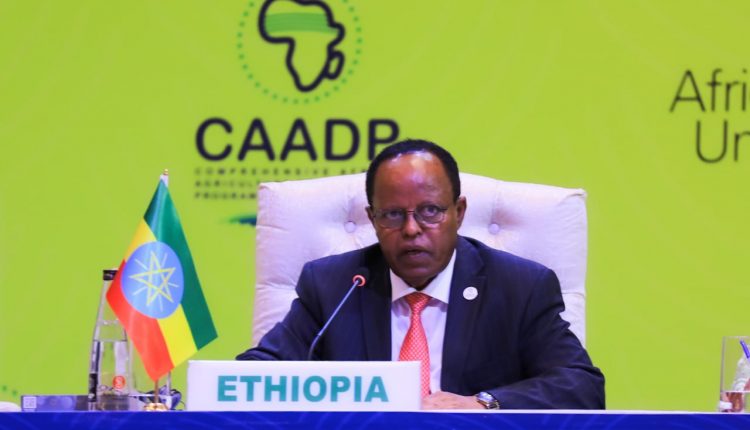Pres. Taye calls for collective efforts to achieve Africa’s food sovereignty and prosperity
Addis Ababa, January 11, 2025 (FMC) – In his remarks at the African Union’s Extraordinary Summit on the Post Malabo Comprehensive Africa Agriculture Development Programme (CAADP) in Kampala Uganda, the FDRE President Taye Atske-Selassie has called for the urgent need for a renewed collective commitment and concerted action to achieve shared vision for an Africa that is food-sovereign and prosperous.

The Summit is being held in Kampala, Uganda, from 9th to 11th January in the presence of Heads of States and Government of the African Union Member State, Ministers of Foreign Affairs, PRCs, Ministers and Experts in-Charge of Agriculture (forestry, fisheries, crops and livestock), Rural Development, Water and Environment, RECs, Youth, Women, Non-State Actors, Media, Academia and Development Partners.

Speaking on behalf of Abiy Ahmed, Prime Minister of Ethiopia and champion of African Agriculture Development Program, President Taye stated that this summit marks a defining moment for Africa where the event is set to chart out the course of Africa’s agri-food system.
The Kampala CAADP Declaration, which follows the crucial Malabo Declaration, signifies a renewed commitment to best propel progress and delivering tangible outcomes for the people in Africa. “It underscores our resolve to address emerging challenges, harness new opportunities, and build a resilient, inclusive, and prosperous agri-food system in Africa,” the Ethiopian president noted.
Africa’s agri-food system is undergoing transformative change driven by a complex interplay of economic, demographic, technological, environmental, and climate factors, he said, adding that over the next decade, understanding this dynamics will be crucial for stakeholders.
In that regard, President Taye emphasized on the following four essential elements which he believes would transform Africa’s agri-food system, fostering economic growth and improving livelihoods across the continent.
First, rapid urbanization: the impact of urbanization on Africa, particularly the growing demand of freshly processed foods and ready-to-eat meals significantly reshape conception patterns in urban areas. This, according to President Taye, shift creates a vital linkage between smallholder farmers and expanding domestic markets driven by sustained economic growth and growing middle class. “Nonetheless, we have to note that in view of Africa’s rapid population growth, meeting the increasing demand for diverse and high-quality food products will present challenges,” he pointed out.
Secondly, the huge potential of technological innovation, such as digital agriculture, precision farming, and other advancements are pivotal to transform Africa’s agri-food system, Taye indicated, asserting that these technologies can enhance productivity, improve efficiency, and increase access to information and market for farmers.
“Ethiopia’s collaboration with the African Development Bank (AfDB) brought forth climate-smart and heat-resistant wheat varieties, making the country as one of the leading wheat producers in Africa,” Taye indicated.
Thirdly, empowering women and engaging the youth will unlock the full potential of the sector as they are the drivers of innovation and resilience in our food system, the Ethiopian head of state mentioned.
Fourth, fostering regional policies such as the Africa Continental Free Trade Area (AfCFTA) is essential for expanding market access, improving food security, and creating more resilient food systems across the continent. The full realization of AfCFTA promises to amplify the success of many African countries that are determined to be on track in building resilient system in food security, Taye added.
This summit is a culmination of an inclusive and collaborative process that has brought together a diverse range of key players and stakeholders, the President said, commending continental and regional bodies for their crucial role in facilitating cross-border collaboration and monitoring progress towards the CAADP goals.
“Through extensive consultation and workshops with member states and development partners, we have ensured that all key actors have meaningfully contributed. This participatory approach underscores our collective commitment to addressing Africa’s agri-food challenges and opportunities through a lens of inclusivity and shared responsibility. Incorporating this diverse perspective has enriched the summit discussions and strengthened the foundation for actionable outcomes,” he further stated.

The draft CAADP strategy and action plan for 2026 to 2035 was prepared with meticulous attention guided by the African Union Specialist Technical Committees whose endorsement has been invaluable. Contribution from experts and researchers have provided critical evidence-based that ensure the strategies both impactful and achievable, Taye mentioned.
These efforts highlight the importance of leveraging technical expertise to build robust framework for Africa’s agri-food system transformation.
President Taye called on the permanent representatives committee, PRC, to actively engage in reviewing the CAADP Kampala Declaration and the 10-year Strategy and Action Plan.
Furthermore, Taye said, “The African basket, where our mothers and sisters carry across Africa, is a powerful symbol of bountiful harvest. It embodies the hearts of African livelihoods and our food system. As we embark on the transformative journey towards a modern agri-food system, let this African basket symbolize our unwavering commitment to ensuring that every African has access to safe nutrition and affordable food.”
He underscored the significance of this summit and the Kampala Declaration in guiding Africa’s journey toward sustainable agricultural transformation.
The President also congratulated the AU Specialized Technical Committee for “exceptional efforts” in leading the development of the CAADP Kampala Declaration Strategy and Action Plan.
Concluding his remarks, President Taye further underlined the significance of moving forward together with a determination and purpose committed to realizing shared vision for Africa’s agri-food system.
By: Mesafint B.


